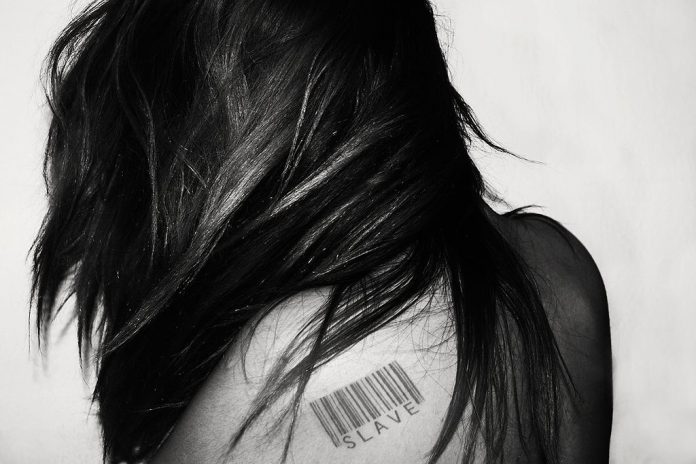There are more slaves today than the period when slavery was legal; and the European Day against trafficking – Friday, October 18 – is not about what happens “to others” but what happens to Europeans. Poverty and social exclusion breed trafficking. Slavery is all around us, if we care to see it, hidden underneath our legitimate markets and rule of law. It is part of our culture, if we tolerate it.
On the occasion of the European Day Against Trafficking in Human Human Beings on October 18, the Hellenic Parliament TV (Vouli Channel) will hold the pan-European opening of the 50-minute “She is not for Sale” documentary.
“She is not for Sale” is a shocking investigation carried out over two years into sex trafficking and forced prostitution in the Middle East, particularly the UAE, considered by many the hedonistic epicenter of the Gulf region, with over eight million tourists a year.
Using secret filming, interview, and expert analysis, the film reveals how women looking for jobs in the service sector are trafficked under false pretenses from different countries, like Moldova, where they end up as slave sex workers.
Tracing survivors as far as rehab shelters in Eastern Europe, where they are trying to put their lives back together, we hear their personal stories, and listen to professionals working in prevention, advocacy, law enforcement, academic and institutional research.
That is a closeup to a world we prefer looking from a comfortable distance.
Trafficking in human beings is the third most profitable crime market in the world after drugs and weapons. A 2017 report by the Australia-based organization Walk Free Foundation estimated that a global population of 45 million people are being trafficked, equal to the population of Poland, Spain, or Ukraine.
According to the International Labour Organization, forced labour alone generates $150bn in revenue, or approximately a treble the amount of Apple’s net operating income. In Europe and Central Asia,62% of trafficking victims are used for the purpose of sexual exploitation, of whom 96% are women and girls. Moldova is the poorest country in Europe, which makes the country ideal for recruitment, with women and girls sent to the massage parlors of Russia, Cyprus, Turkey, and the United Arab Emirates.
In the UAE, 90% of the population are foreigners, but there is not a single migrant. The legal status of foreigners is completely dependent on the employer, who can withhold papers and the salary of any employee, with little protection from the state. Dubai alone receives eight million tourists a year, in a hedonistic paradise whose foundation is morally questioned only in few high-profile cases involving “westerners” – particularly, arbitrary arrests and lengthy detentions –of UK citizens, such as Matthew Hedges (a student accused of spying), Laleh Shahravesh (for posting an insult on Facebook), Ellie Holman (given free alcohol on Emirates Airlines, then arrested) and Andrew Neal (accused of drug dealing).
It is for this reason that the UAE (and others) are frequently accused of promoting trafficking and sexual abuse of, so-called, expatriates. Since 2006, there have been only seven convictions of human traffickers in the UAE. But while this is an extreme case of what happens on the fringes of Europe, outside Europe, we should not get too comfortable.
Trafficking is parasitic to the real market, rule of law, gender relations. It leaves its dark cloud everywhere. The discussion about this film in Greece was all about Greece. It featured an uncomfortable discussion on how the challenge at hand, engaging MPs, representatives of the police, and the National Rapporteur for Human Trafficking, of the Ministry of Foreign affairs. We also heard testimonies from NGOs, including Ana Revenco, of La Strada Moldova, and Niki Roubani of the European Women’s Network, Greece. The most uncomfortable truth is that in a country of 10 million people there are 550,000 clients.
Clients feed this market, that consider legitimate this daily exploitation of foreign, poor women and girls, that do not have the legal or social status to be afforded the dignity of the women they can empathise with, mothers, sisters, and daughters. This uncomfortable truth is the subject of this film, this day, and this discussion. Let’s us make of this a day of reckoning, not commemoration. As Bennet said, “there’s no better way of forgetting something than by commemorating it.”
Vasso Kolia served as a State Secretary for Gender Equality (2013-2015) and is a business development consultant for a number of companies. Kollia served as a General Secretary of the European Union of Women NGO (EUW: 1999-2003).

